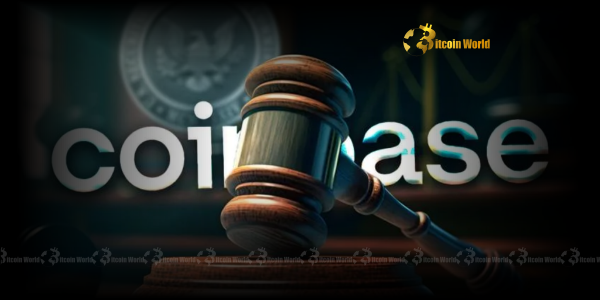
The cryptocurrency world is abuzz with the latest news: a significant Coinbase lawsuit has been filed against Oregon Governor Tina Kotek. This isn’t just another legal squabble; it’s a pivotal moment highlighting the ongoing battle for clear and fair digital asset regulation across the United States. If you’re invested in crypto, this development from the Beaver State demands your immediate attention.
Understanding the Core of the Coinbase Lawsuit
In a bold and significant move, Coinbase Exchange initiated legal proceedings against Oregon Governor Tina Kotek in Marion County Circuit Court. The core of their demand? Transparency. Coinbase is seeking the disclosure of public records related to what they describe as Oregon’s abrupt and unexplained shift in its crypto asset regulatory policy. This isn’t a minor dispute; it’s a direct challenge to the state’s sudden actions that have sent ripples through the local crypto community.
According to reports from The Washington Times, Coinbase asserts that in April of this year, the Oregon government drastically altered its stance on digital assets. What was once a relatively open environment suddenly saw 31 specific digital asset transactions on the Coinbase platform labeled as regulated securities. The exchange argues that this dramatic change occurred without any meaningful public participation or adherence to standard rule-making procedures.
- The Demand: Disclosure of public records regarding the policy change.
- The Accusation: Oregon changed its stance without public participation.
- The Impact: 31 digital asset transactions on Coinbase now labeled as regulated securities.
- The Concern: Affects thousands of Oregon traders and holders without proper discussion.
The Sudden Shift in Oregon Crypto Policy: What Happened?
The crux of Coinbase’s complaint revolves around the lack of transparency and due process in Oregon’s decision-making. Imagine waking up one day to find that assets you hold, which were previously considered commodities or property, are now suddenly deemed securities by your state government. This is precisely the scenario thousands of Oregonians are facing. The Oregon crypto policy shift affects not just Coinbase as an exchange, but every individual trader and holder in the state utilizing these specific digital assets.
The absence of public discussion, workshops, or formal rule-making procedures is a critical point of contention. Regulatory changes, especially those with such far-reaching implications, typically involve extensive stakeholder engagement. This ensures that the perspectives of affected parties are heard and considered, leading to more robust and fair regulations. Coinbase’s lawsuit underscores the importance of this democratic process in the rapidly evolving world of digital assets, especially when a state’s Oregon crypto policy impacts so many.
The Broader Implications for Digital Asset Regulation
This lawsuit isn’t just about Oregon; it has significant implications for the broader landscape of digital asset regulation across the United States. The classification of cryptocurrencies as securities remains one of the most contentious and debated topics in the crypto space. The U.S. Securities and Exchange Commission (SEC) has often taken an aggressive stance, labeling many digital assets as unregistered securities. However, state-level actions, especially those appearing arbitrary, add another layer of complexity and uncertainty.
The outcome of this case could set a precedent for how other states approach crypto regulation. If Oregon’s sudden policy change without public input is allowed to stand, it could encourage similar actions elsewhere, leading to a fragmented and unpredictable regulatory environment. Conversely, a victory for Coinbase could reinforce the need for transparent, participatory, and consistent regulatory frameworks for digital assets nationwide.
Consider the following challenges arising from such abrupt shifts in digital asset regulation:
| Challenge | Description |
|---|---|
| Regulatory Uncertainty | Inconsistent state-by-state rules make compliance difficult for exchanges and users. |
| Investor Protection | Sudden reclassification can trap investors in assets they no longer understand legally. |
| Innovation Stifling | Unpredictable regulations can deter crypto businesses from operating or innovating within certain states. |
| Due Process Concerns | Lack of public participation undermines democratic principles in rulemaking, leading to distrust. |
Why the Classification of Crypto Securities Matters
The distinction between a commodity and a security is fundamental in financial law, and it dictates which regulatory body has jurisdiction and what rules apply. If a digital asset is classified as a crypto securities, it falls under strict disclosure requirements, registration mandates, and investor protection laws, typically enforced by securities regulators. If it’s a commodity, it might be regulated by the Commodity Futures Trading Commission (CFTC) or fall outside specific federal oversight depending on its nature.
For Coinbase, operating as a regulated entity, a sudden reclassification of assets on its platform without warning creates immense operational and compliance hurdles. It means potentially having to retroactively comply with an entirely different set of rules for transactions that have already occurred, or for assets that were listed under a different understanding of the law. For users, it could mean their holdings are now subject to new tax implications, trading restrictions, or even potential legal liabilities they were unaware of, all due to a sudden shift in what constitutes crypto securities.
The Path to Regulatory Clarity: What’s Next?
The ultimate goal for the crypto industry, and indeed for consumers, is regulatory clarity. This lawsuit is a stark reminder of how far we still are from achieving that. Coinbase’s action is not just about its own operations; it’s about advocating for a predictable and transparent regulatory environment that fosters innovation while protecting consumers.
What can we expect moving forward? The lawsuit will likely involve discovery, where both sides gather evidence, and potentially motions to dismiss or for summary judgment. It could culminate in a trial or, as is often the case, a settlement. Regardless of the immediate outcome, this case will undoubtedly add to the growing body of legal precedent surrounding digital assets and push for greater accountability from state regulators.
For Oregon residents holding digital assets, it’s crucial to stay informed. While the lawsuit progresses, the legal status of the 31 digital assets in question remains ambiguous under Oregon law, creating an uncertain environment for thousands of traders and holders. This case serves as a powerful reminder that vigilance and engagement with the evolving regulatory landscape are more important than ever for anyone involved in the crypto space, especially as the quest for true regulatory clarity continues.
Conclusion: The Coinbase lawsuit against Oregon Governor Tina Kotek is more than just a legal battle; it’s a critical moment for the future of digital asset regulation. It underscores the urgent need for transparency, public participation, and consistent frameworks in classifying crypto assets. As the industry continues to mature, clear and predictable rules are paramount for fostering innovation, protecting investors, and ensuring the healthy growth of the crypto economy. The outcome of this case will undoubtedly shape the conversation around state-level crypto policies for years to come.
To learn more about the latest crypto market trends, explore our article on key developments shaping digital asset regulation.





